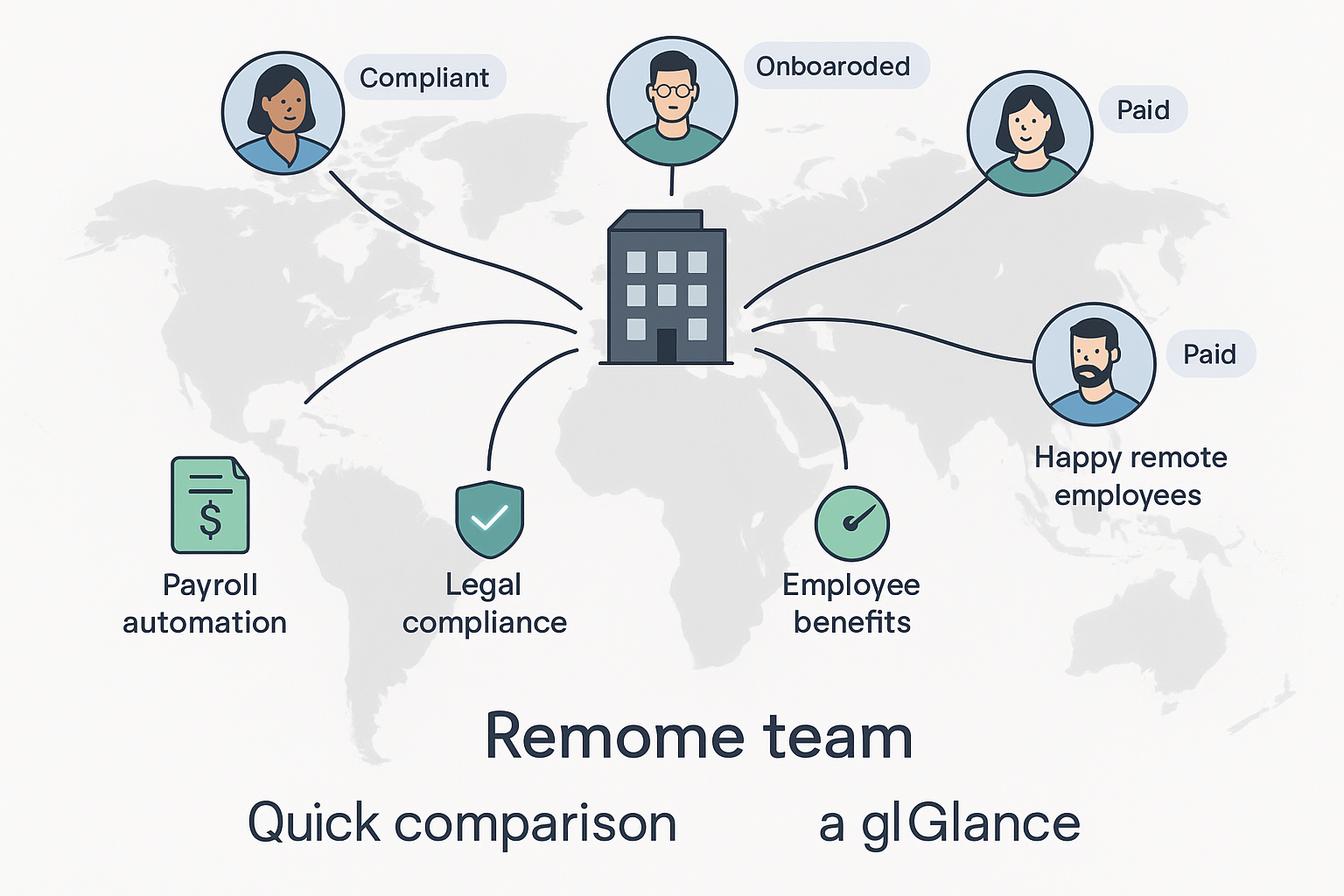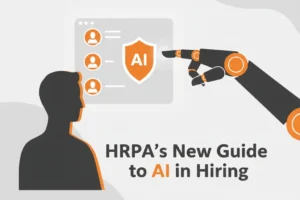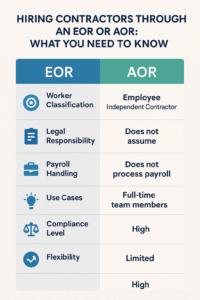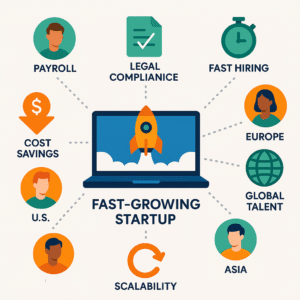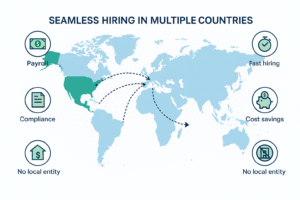Introduction
Remote work has become a permanent fixture of the modern workplace, fundamentally changing how companies hire and manage talent. By 2025, an estimated 36.2 million Americans (about 22% of the U.S. workforce) will be working remotely, and Canada is seeing a similar shift with over 30% of Canadian employees working off-site. This rise in remote teams unlocks access to wider talent pools and offers flexibility for both employers and employees. Studies even show that remote work can save companies up to $11,000 per employee in overhead costs annually and boost productivity by 13% or more. In short, remote teams can be a win-win for businesses – if they are managed effectively.
However, for all its benefits, managing a distributed workforce comes with unique challenges. Employers must navigate a maze of HR and legal hurdles when team members are spread across different cities, provinces, states, or even countries. Each location may have its own labor laws, tax regulations, and compliance requirements, making it difficult to ensure every remote employee is properly classified and cared for. HR tasks like payroll, benefits, and onboarding become more complex at a distance. Missteps can lead to costly penalties or talent dissatisfaction. In fact, labor regulations are often so confusing and varied that even seasoned hiring managers admit they are tough to follow.
So, how can a company reap the benefits of remote work without stumbling over these pitfalls? The answer is partnering with an Employer of Record (EOR). An EOR serves as a dedicated third-party HR partner that handles the employment legwork on your behalf. This article will explore why EOR services are ideal for remote teams. We’ll look at the concrete ways an EOR can solve remote workforce challenges – from compliance assurance to streamlined payroll – and how this lets you focus on leading your team. With the right EOR support, you can confidently embrace remote work as a long-term strategy for growth.
What Is an Employer of Record (EOR)?
Before exploring the benefits, let’s clarify the concept. An Employer of Record is a third-party organization that takes on the role of the official employer for your workers. This means the EOR handles all the employment-related responsibilities – issuing paychecks, withholding taxes, providing benefits, and ensuring labor law compliance – on your behalf. The workers perform their jobs for your company, but legally they are employees of the EOR. For remote teams, an EOR essentially serves as the local employer wherever your team members are located. This allows your business to hire talent in multiple states or countries without needing a legal entity in each place.
In practice, when you engage an EOR, you tell them who you want to hire and at what salary/position, and the EOR will “hire” that person through its own local entity. Your company still directs the person’s day-to-day work. The EOR simply becomes the employer of record for administrative purposes, taking care of all the HR details in the background.
Why an EOR Is Ideal for Remote Teams
By now, it’s clear that remote teams come with extra HR complexity. Employer of Record services directly address those challenges, making it far easier to manage and support a distributed workforce. Here are the key reasons an EOR is an ideal partner for remote team management:
Guaranteed Compliance in Every Location
If your remote employees are spread across different provinces, states, or countries, keeping up with each region’s labor laws is a tall order. An EOR removes this burden by ensuring compliance with all local employment regulations on your behalf. They handle state/provincial tax withholdings, mandatory benefits (like workers’ compensation or health insurance requirements), and labor law observances (such as overtime rules or termination procedures) for each worker. This means no matter where your remote team members are based, you won’t inadvertently run afoul of local laws. The EOR’s experts stay current on regulatory changes and make sure your company avoids penalties and legal risks.
Streamlined Payroll and Benefits Administration
One of the hardest parts of managing a remote team internally is running payroll across multiple jurisdictions. Different locations have different tax rates, currency conversions, and pay schedules. An EOR takes this challenge off your plate. They will pay your remote employees accurately and on time in the appropriate currency, and handle all payroll tax filings in each locale. Likewise, the EOR administers benefits for your team – from health insurance to retirement plans – according to local standards and requirements. Your remote staff get the benefit packages they’re entitled to, and you don’t have to become an expert in foreign payroll or benefits law. This not only saves you time, but also ensures employees have a consistent, positive experience no matter where they work.
Faster Onboarding of Remote Hires
Hiring a new remote employee in a location where you haven’t operated before can involve weeks of paperwork – unless you use an EOR. With an Employer of Record, you can onboard remote talent extremely quickly. The EOR already has entities and HR infrastructure set up, so they can hire a person on your behalf in days instead of the months it might take you to register as an employer in that jurisdiction. This is especially valuable when you find a great candidate in another country; you want to bring them aboard before they get away. An EOR makes that possible by handling the contract generation, work eligibility checks, and enrollment in local systems immediately. Your new hire can start contributing right away, without bureaucratic delays. In short, an EOR gives your remote team scalability – you can add team members from virtually anywhere on short notice.
Improved Remote Employee Experience
Using an EOR doesn’t just help your HR department – it also benefits your remote employees. Workers hired through an EOR enjoy the stability of being a formal employee (of the EOR) rather than a contractor. They receive all applicable benefits and protections under the law in their location, which boosts their job security and satisfaction. The EOR’s local HR support means your team members have someone to turn to for questions about payroll, benefits, or compliance in their region, in their time zone. This professional handling of HR matters leads to a better overall employee experience. Remote staff feel more connected and taken care of, despite the physical distance. A positive employee experience translates to higher retention and engagement – a big win for your company.
Focus on Core Business (Leave HR to the EOR)
Managing HR compliance and paperwork for a remote team can quickly become a full-time job, especially for smaller businesses. Every hour spent figuring out another state’s tax form or arranging an international wire transfer is time not spent on strategic work. By outsourcing these administrative tasks to an EOR, your leadership and HR team can focus on core business priorities. The EOR handles the routine (but critical) HR processes behind the scenes. You can invest your energy in product development, customer acquisition, and managing your team’s performance – confident that the “back-office” details are under control. Many companies find that partnering with an EOR not only reduces liability and headaches, but also improves overall efficiency. It’s a way to reclaim time and resources, which is especially valuable for growing companies. As one study notes, outsourcing HR through solutions like EOR can free up internal teams to drive growth and innovation rather than get bogged down in paperwork.
Conclusion
Remote work is here to stay, and it offers tremendous advantages for employers willing to embrace it. By leveraging the support of an Employer of Record, companies can enjoy the benefits of remote teams without the typical hurdles. An EOR acts as a trusted partner that takes care of compliance, payroll, and HR administration for your distributed workforce. This leaves you free to manage projects and people, rather than policies and paperwork.
If your organization is building or expanding remote teams across Canada, the United States, or globally, working with an EOR is a smart move to stay agile and compliant. Divino Business Solutions can serve as your Employer of Record, handling the hiring and HR complexities for your remote employees so you don’t have to. We specialize in helping businesses outsource their HR and payroll needs, ensuring that your team members – no matter where they are located – are properly taken care of and legally employed.
With the right EOR in place, you can scale your remote workforce confidently, knowing that every worker is on-boarded correctly and every regulation is met. Divino’s services allow you to outsource your hiring and HR management effectively, giving you peace of mind and more time to focus on growth. Remote teams have unlocked a new world of possibilities – and with an Employer of Record, you have the key to manage them successfully.
Frequently Asked Questions (FAQs)
What does an Employer of Record do for remote teams?
An Employer of Record handles all the employment-related tasks for remote workers on behalf of your company. This includes processing payroll, withholding and remitting taxes in the employee’s locale, providing mandated benefits, and ensuring labor law compliance in each location. Essentially, the EOR becomes the official employer for the remote employee (for legal and tax purposes), while your company directs the person’s day-to-day work. For remote teams, this means the EOR takes care of HR administration across different states or countries, so you don’t need separate systems or entities in each place.
Is using an Employer of Record legal?
Yes, engaging an Employer of Record is a legal and commonly used practice for handling distributed employment. The arrangement is similar to using a third-party payroll provider or staffing agency, but with a broader scope. The EOR operates under the labor laws of the worker’s location and ensures your company remains in compliance. There is a formal contract between your company and the EOR outlining the responsibilities. As long as you work with a reputable EOR provider, the model is completely legal and recognized in most countries as a way for companies to hire internationally or in multiple jurisdictions.
How is an EOR different from a PEO or staffing agency?
An EOR (Employer of Record) differs from a PEO (Professional Employer Organization) in that an EOR becomes the legal employer of your workers, whereas a PEO is a co-employment arrangement where you still need a legal entity and share employer responsibilities. PEOs typically require your business to already be established in the employee’s country/state and then assist with HR tasks, while EORs let you hire in places where you have no entity at all. Compared to a staffing agency, an EOR is not supplying you temporary labor or recruiting candidates (unless that’s an added service) – rather, you find your own team members and the EOR simply employs them for you. Think of an EOR as your outsourced HR department and legal employer in one.
When should my business consider using an EOR for remote hires?
You should consider an EOR whenever you’re hiring outside of your home jurisdiction or lack the capacity to handle multi-region employment compliance. Common scenarios include: hiring an employee who lives in a different province or country where you don’t have an office, expanding your talent search globally to find specialized skills, or transitioning contractors to full employees to give them benefits. Small and mid-sized companies often use EOR services because they don’t have internal HR/legal teams in every region. It’s also useful as an interim solution – for example, if you want to test a market or an employee’s fit before committing to opening a local entity.
How do I choose the right EOR provider?
Choosing an EOR provider involves evaluating a few key factors:
- Geographic coverage: Make sure the EOR operates in the countries or states where you need to hire.
- Expertise and compliance record: Look for providers with a strong track record of compliance and knowledge of local labor laws. Check if they have reputable clients or case studies.
- Services offered: Aside from payroll and compliance, do they handle benefits administration, help with onboarding, or offer any recruitment support if needed?
- Pricing structure: Understand how they charge (per employee fee, percentage of salary, etc.) and ensure it’s transparent with no hidden costs.
- Service and support: Ensure they provide responsive support for both you (the client) and your employees. Reliable communication is important, especially across time zones.
By considering these factors, you can select an EOR that fits your company’s needs and will be a trustworthy partner in managing your remote workforce. Check out how to simplify recruitment or The Bias of Interviews: Are You Just Hiring a Smile?
Sources
- Upwork – Future Workforce Pulse Report, 2020 (predicted 36.2 million Americans working remotely by 2025)
- Staffing Industry Analysts – Canadians working remotely now at 20% (reports ~5 million Canadians working remotely, ~30% of workforce)
- Global Workplace Analytics – Telework Savings Calculator Highlights (remote work saves ~$11,000 per employee per year)
- Stanford University – Does Working from Home Work? (study showing 13% performance increase among remote workers)
- Remote.com – Hiring Globally Made Easy (talent expert on confusing labor laws across countries)
- TCWGlobal – How EORs Are Revolutionizing Remote Workforce Management (Upwork remote work stats and benefits of EOR for remote teams)
- TopSource Worldwide – Empowering Remote Teams with EOR Services (insights on enhancing remote employee experience)
- HSP Group – Why Your Business Needs a Global EOR (EOR allows fast onboarding within weeks; saves HR resources)
